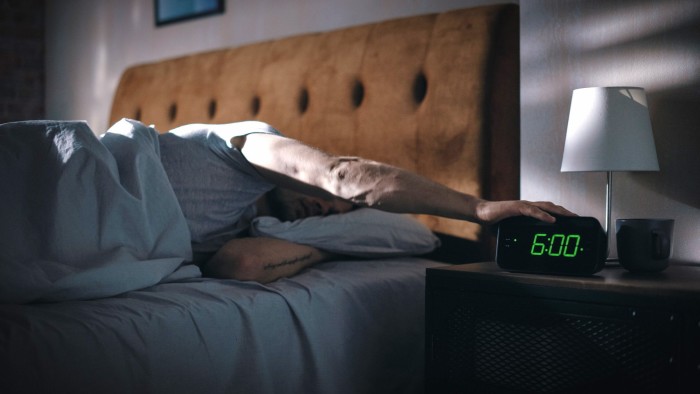Unlock the Editor’s Digest for free
Roula Khalaf, Editor of the FT, selects her favourite stories in this weekly newsletter.
Sleeping on the job! That was one reaction to a report by The Sunday Times that Heathrow chief executive Thomas Woldbye knocked off at 12.30am last Friday morning to go to bed, leaving his deputy to decide to close the UK’s biggest airport. Some expressed surprise that stepping away mid-crisis, just hours after a fire broke out at a nearby power substation, was conducive to shut-eye. Transport minister Heidi Alexander told LBC Radio: “I’ve had to deal with some pretty stressful situations in my time. I probably would struggle to sleep, to be honest.”
Guy Meadows, founder of the Sleep School and author of The Sleep Book: How to Sleep Well Every Night, was incandescent about such criticisms. “I can’t believe we’re still talking about this in 2025,” he tells me. “I’m tired.” He thought the old mantra of “sleeping is cheating” was in retreat as organisations better understood the relationship between sleep and performance, problem-solving and decision-making.
The annoying thing with crises is that no one knows how long they will last. Jan Hagen, a professor of management practice at the European School of Management and Technology, who researches organisational mitigation of human error, says: “A CEO handing over responsibility to a well-rested and qualified second-in-command, or even better a crisis team, at 12.30 in the night, seems sensible.”
His view is that one key aspect of a leader’s role in a crisis is to ensure adequate rest periods — for themselves and their teams. “Ideally, organisations train for different scenarios and have established crisis teams who are empowered to take decisions.”
Businesses responsible for critical infrastructure should have at least three teams to work in shifts of eight hours, he suggests. “In the case of Apollo 13 there were even four teams set up for the flight director function — apart from the many other teams for special functions.”
While the buck stops with the CEO — they are ultimately very well paid to make the big calls — Chris Clearfield, co-author of Meltdown: Why Our Systems Fail and What We Can Do About It, argues that “leadership is, in some ways, about getting things done when you’re not in the room”.
The bottom line, says Hagen, is that “fatigue has a degrading effect on human performance — comparable to alcohol intoxication”. It has been linked to a number of disasters including the accident at the Chernobyl nuclear power plant and the Exxon Valdez oil spill. Would you board a flight if you knew a pilot was pushing on through? No. That is why pilots are required to schedule adequate rest.
When I watch politicians hot off the campaign trail, staying up through election night, making speeches and appointments, I am slightly aghast. One researcher wrote of poor outcomes in marathon political summits: “Decision-making under the influence is bad for everyone. It harms the decision makers, and it has a high chance of stalling negotiations and producing policies that are irrationally risk-taking.”
Every year Meadows holds an annual workshop at a Big Four consultancy on the role that sleep plays in improving leadership, for partners who typically deal with late-night calls and fly across time zones. One of the topics of discussion is reasons they do not take a break, which can be cultural or psychological, such as perfectionism. It takes “strength”, he says, to override others’ judgment to get some rest.
For a moment during the pandemic, hustle culture celebrating punishing hours looked like it was disappearing as wellness rose up the corporate agenda. Meadows observes there was even interest in chronotypes, as people adapted to their natural schedule and understood that night owls and larks improved productivity if they worked to their personal pattern. “From an evolutionary standpoint,” says Meadows, “it makes sense as late sleepers can stand on guard at night.” However, I fear that — like the office — the old belief that sleep is for losers may be making a return. Elon Musk and Donald Trump like to boast of their white-collar grind.
Perhaps we can take our guidance from another tech oligarch, Jeff Bezos, who once outlined his need for eight hours of sleep, with his first meeting at 10am, allowing for “puttering time”. As he pointed out: “As a senior executive, you get paid to make a small number of high-quality decisions. Is that [pay] really worth it [for the company] if the quality of those decisions might be lower because you’re tired or grouchy?”
Read the full article here

